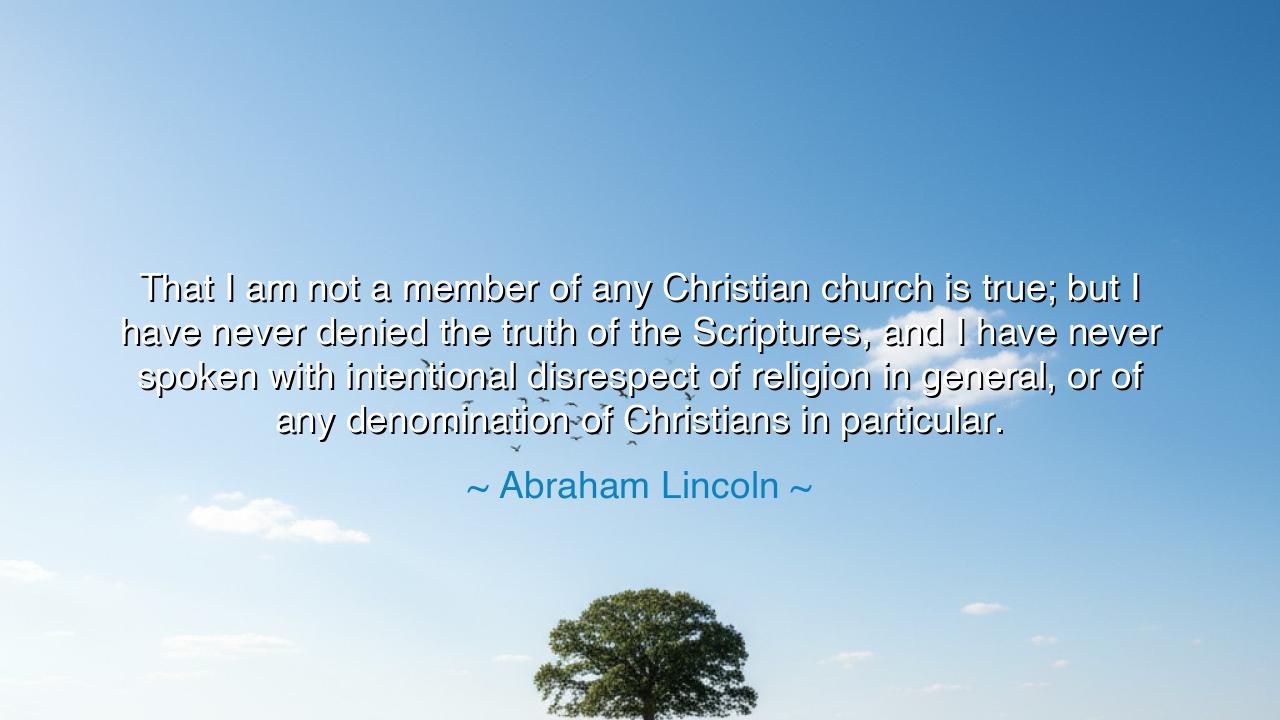
That I am not a member of any Christian church is true; but I
That I am not a member of any Christian church is true; but I have never denied the truth of the Scriptures, and I have never spoken with intentional disrespect of religion in general, or of any denomination of Christians in particular.






"That I am not a member of any Christian church is true; but I have never denied the truth of the Scriptures, and I have never spoken with intentional disrespect of religion in general, or of any denomination of Christians in particular." These words of Abraham Lincoln offer a profound reflection on the relationship between faith, religion, and individual belief. Lincoln’s statement emphasizes that one’s personal spirituality need not be defined by adherence to a specific denomination or membership in an organized institution. Instead, what matters is the respect one holds for the truths found within those teachings, and the reverence with which one approaches the larger spiritual quest. Lincoln, a man of deep personal reflection, understood that the essence of faith lies not in external rituals but in the integrity and sincerity of one’s heart and actions.
The origin of this thought can be traced to the great thinkers and philosophers of the past, who often grappled with the question of organized religion versus personal spirituality. Socrates, the father of Western philosophy, for example, never founded a religious institution, yet his deep respect for the divine and his belief in the pursuit of wisdom made him one of the most spiritually significant figures in history. Like Lincoln, Socrates did not adhere strictly to the doctrines of the time but instead sought a deeper connection with truth and the higher moral order. His legacy shows us that faith can be a deeply personal journey, one that transcends the boundaries of any one religious tradition.
Consider the life of Albert Einstein, a scientist and thinker whose spirituality was not aligned with any formal religious tradition, yet who spoke often of a spiritual awe in the face of the mysteries of the universe. Einstein said, “I want to know God’s thoughts; the rest are details.” This aligns with Lincoln’s sentiment — that respect for the divine and an appreciation for sacred truths do not require formal adherence to a religion. Einstein’s view of the world was shaped by a reverence for the mystery and wonder of existence, something he saw reflected in both science and spirituality. His life exemplifies the notion that one can honor the truths of the scriptures without necessarily identifying with any one religious system.
At the same time, Lincoln’s words point to an essential truth about how we should approach faith and religion in our daily lives. In a time of intense division, especially during the Civil War, Lincoln’s call for unity and respect for all faiths was a message that transcended sectarian boundaries. Lincoln's leadership during this period was guided by a deep sense of moral responsibility, informed by his respect for the sacred and the moral teachings of various religious traditions. In his own life, Lincoln navigated the deep emotional and spiritual challenges of his presidency with a quiet and profound faith that was rooted in personal experience rather than institutional affiliation.
In the midst of the American Civil War, when the country was torn apart by conflict, Lincoln often turned to scripture for comfort and guidance. He publicly quoted scripture on numerous occasions, acknowledging the wisdom and moral clarity that religion brought to human life. Yet, despite his deep respect for Christian teachings, he also refused to align himself with any particular church, reflecting a humility and independence of thought that allowed him to maintain his personal connection with the divine without subscribing to rigid dogmas. This example shows us that one need not adhere to a specific religious institution to possess a profound faith or to engage deeply with spiritual truths.
The lesson here, both from Lincoln and from the broader wisdom of the ancients, is that faith is a deeply personal matter, one that transcends the constraints of religious institutions. It is the truth within the scriptures — the universal values of love, compassion, and justice — that should guide us, not the label of the institution to which we belong. Lincoln reminds us that we can honor the moral teachings of any religion, without being bound by its formal structures. True spirituality lies in actions, integrity, and respect for the truths of the universe, and not in the outward symbols of religious affiliation.
Thus, in our own lives, we should strive to cultivate a faith that is grounded in respect for the sacred and the moral truths that transcend human divisions. Honor the divine not by adherence to any specific tradition, but by the way we treat others and the integrity with which we live. Let us approach religion not as a means of identification, but as a path to personal growth, humility, and a deeper connection to the divine. Embrace the wisdom of Lincoln, Socrates, and Einstein: that the essence of spirituality lies in the truths we live by, rather than the institutions we join.






AAdministratorAdministrator
Welcome, honored guests. Please leave a comment, we will respond soon